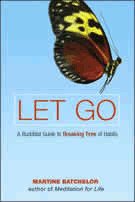Buddhist Recovery Network book review
“Let Go: A Buddhist Guide to Breaking Free of Habits”
Martine Batchelor
Wisdom Publications, 2007.
ISBN 0-86171-521-7
Paperback. 190 pages.
School/perspective: Martine Batchelor is an experienced Zen practitioner
 Order this book online at Amazon
Order this book online at Amazon
Chapter headings:
- Introduction
- Patterns
- Meditation
- Grasping
- Mental Habits
- Lost in Emotions
- Signals of the Body
- Recovering from Addiction
- Love
- Compassion
- Ethics
- A Creative Path
- Afterword
- Acknowledgements
- Bibliography
- Index
Selected excerpts:
“In England there is an association, The Prison Phoenix Trust, which is dedicated to teaching meditation and yoga to prisoners. This organization sends out a quarterly newsletter with one section dedicated to prisoners’ letters. Often these prisoners are drug addicts and it is inspiring to see the liberating effect meditation and yoga can have for these men and women. One prisoner pointed out that doing meditation helped his recovery from addiction by allowing him to feel free and to no longer need to be in control of the world around him......
The prisoners found that meditation helped them to accept themselves and encounter their inner mental or emotional turmoil in a spacious and lighter manner. After leaving jail they continue to benefit from meditation. The patterns of mental obsessions and physical compulsions that led to addiction are hard to dissolve. But over time, it seems that meditation can contribute to creating space within those patterns. Then people can start to experience something different, another dimension of their existence. They can discover that their capacities are greater than they ever imagined. But they need to trust and have faith in the potential for growth that is in each of them.
Meditation allows us to be more present - not in an abstract manner but in such a way that we experience the actual reality of being alive, breathing, standing, feeling, sensing in a more direct manner. Life then has a different feel. It seems to flow and has its own depth and riches.” (pp. 103 - 105) [She goes on to say that in recovery meditation should be supported by other work]
© 2007 Martine Batchelor
The Buddhist Recovery Network does not officially endorse any of the book reviews that appear on this site. They are private viewpoints that may or may not represent the views of the organisation or its members. Readers are free to submit book reviews for publication on this site via the link below.
Reviews posted:
Paul -
I must declare myself up front to be a big fan of the Batchelors, Martine and Stephen. Prior to reading this I had read Martine’s book on Zen, and Stephen’s book Buddhism Without Beliefs. I have even described myself on occasion to my Buddhist friends as a “Stephen Batchelor Buddhist” because of the agnostic position on rebirth he beautifully articulates in Buddhism Without Beliefs. So, it was with great expectation that I bunkered down by a log fire in a guest house in the Blue Mountains, west of Sydney, and buried myself in Let Go. It didn’t disappoint. Her writing style is warm, gentle, and accessible. The book provides an overview of the way Buddhist practice can help free us from a variety of habitual patterns of behaviour. The book is rich with examples drawn from her own life and contains a high degree of personal disclosure. While not suffering from addiction, she writes engagingly about her own habitual patterns (for example ‘planning to pack’). She makes reference to Dr Jon Kabat-Zinn’s work on Mindfulness-Based Stress Reduction, the work of Mark Williams, John Teasdale and Zindel Segal on depression, and Dr Jeffrey Schwartz’s work with OCD. There is one chapter on Addiction (from which the above excerpt is drawn), although the themes and insights of the other chapters are very relevant to those recovering from addiction. Her reference list shows her to be aware of four of the 27 titles reviewed on this site to date (Dharma Punx, 12 Steps on Buddha’s Path, The Tao of Sobriety and Brain Lock). If this was an academic work one would pronounce the research effort very poor indeed, but it is not an academic work, and is more aiming (I think) to provide Martine’s perspective, supplemented with some reading around the topic. At least she is not pretending (as some do!) that she is the first person ever to stumble upon this topic. In terms of my personal take-out, I loved her observation that in the company of Korean Zen Masters she felt the complete absence of tension. Letting go of tension and holding things lightly (rather than clenched) is a constant practice for me. For someone with my obsessive nature I can’t read too many injunctions to do this. I also liked her discussion on combating fear with mindfulness, and her observation that often we are frightened by an idea of something, which when we confront the concrete reality itself, in the moment, is nothing like we imagined.
Review submission
To have a review of this book considered for publication, please email it to contact at buddhistrecovery dot org



 Copyright © 2008-2024 Buddhist Recovery Network
Copyright © 2008-2024 Buddhist Recovery Network